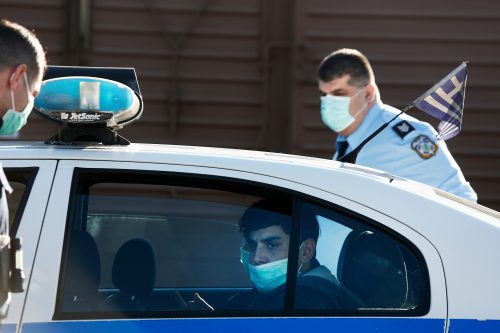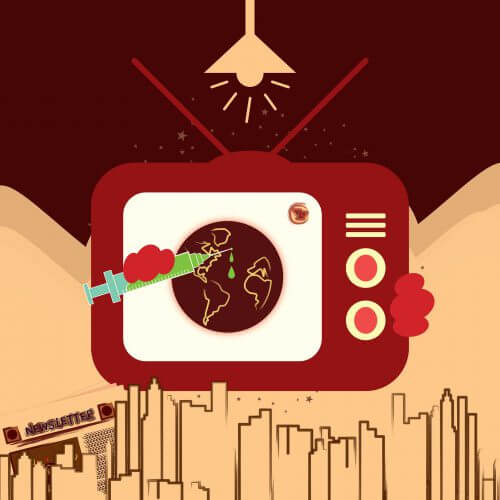This is what Ahmed Firas Khaled, a doctor, educator, researcher and health policy consultant at McMaster University in Canada states, who emphasizes in an interview with the website 'Hidan' the importance of science-based policy, and is concerned about the consequences of a corona outbreak in Syrian refugee camps and vulnerable populations

No country in the world is prepared to deal with the corona virus, and 77% of them are unable to receive data in real time. This is what Ahmad Firas Khaled, a doctor, educator, researcher and health policy consultant at McMaster University in Canada, states in an interview with the Hidan website.
“Health crises like the current COVID-19 outbreak have the potential to affect large numbers of people and disrupt health systems. The urgency and scope of the health crisis often result in life-saving decisions to ensure the best treatment for those infected and limit the infection, it is very important that these decisions are based on evidence from studies."
Khaled is concerned about the amount of misinformation being spread on social networks and the internet about the corona virus, and explains that relying on such information will worsen the epidemic, and governments must help spread reliable and grounded information before people act on misinformation.
How do you prevent the disease from spreading in the refugee camps, especially those where Syrian refugees stay without organized health services?
” That's a great question, I think that would be a problem that governments need to address. When we look, for example, at Turkey, Jordan and Lebanon, we see that the workers there have difficulties in implementing the instructions of the World Health Organization. For example, the requirement to wash your hands for 20 seconds, this is on the assumption that people have access to clean water. The problem starts to get bigger when we talk about large refugee camps such as the Jezin refugee camp in Jordan. As far as I know, we haven't seen any cases of corona coming out of the camps yet, but I'm afraid it might happen. It's only a matter of time."
What does your research show?
The Nuclear Threat Initiative (NTI), the Center for Health Security at Johns Hopkins University and the Economist Intelligence Unit (EIU) this week published the first global health security index of its kind. This is the first comprehensive assessment that included 108 countries and reviewed their ability to cope with the epidemic. The first conclusion is that there is not even one country that is completely prepared. I estimate that developed countries, including Israel, will activate mechanisms that are able to deal with the epidemic such as isolation, but no one is completely prepared. For this to happen, a combination of good health services and awareness in the community must be included all sectors of civil society, including academic institutions, in order to prevent the spread as much as possible and to respond quickly to all cases.
Is there a difference in the ability to respond, even if it is partial, between the countries of the West and the Third World?
"The answer is yes. The director-general of the World Health Organization told a press conference on Thursday that the world should be on high alert now and that this is not a drill. He specifically referred to developing countries where the health system is weak. However, it is clear that Western countries can also cope with partial measures. Let's take for example Canada, where I live, where there are 34 cases (as of Thursday 5/3/20 AB) but we are not closing the stores, nor the airports. We undertake a risk assessment. Compare this to countries like the United Arab Emirates and Greece that closed schools when there were far fewer cases. This is a defensive action. In Canada we have a strong health system to which is added an operations center for coordination between the different levels of government. We are also trying very hard to anticipate a cure for the plague by providing information to the public in an effective way. The managers of the public health system in Canada update the general public on Twitter. We apply what we have learned to previous infectious diseases such as Ebola and SARS. I think that the first priority of all governments should be to reassure the public and provide them with the facts and recommendations such as: wash your hands for 20 seconds, cover your mouth and nose, etc. On the Internet we see false information that endangers everyone's health and causes hysteria."

In his article on The Conversation website Khaled suggests ways to increase the distribution of correct information:
"The Director General of the World Health Organization, Dr. Tetros Gribsos, recently emphasized the need for research evidence for decision-making and policy implementation in dealing with the corona virus. The organization published a Global Health Security Index, the first comprehensive assessment and examination of health security in all 195 countries and it was found that not a single country in the world is completely prepared to deal with an epidemic, with 77 percent of countries not having the ability to collect data in time. Research evidence can help decision makers respond in a timely manner in such situations. However, as my research confirms, the most relevant and up-to-date evidence may not always be accessible. Based on my years of research on the subject, and based on evidence in crisis areas, I outline five feasible strategies that make health research accessible and available to those who make the policy and clinical decisions."
1. Strengthening current and accessible research information sites
Decision makers face challenges in accessing reliable information when faced with a crisis, emphasizing the need for evidence sites to support a planned time with reliable information. My research has shown the importance of having an organized and relevant online information source that gives decision makers quick, easy and highly efficient access to the best possible available evidence to support the decision making process. For example, that links from these sites will not reach pages that access is restricted or that are behind paywalls
In my research, I offer seven specific suggestions on how to improve the scientific evidence sites in order to make better decisions when dealing with a crisis:
• Provide advanced search features.
• Clearly state the purpose of the site and the type of information it provides.
• Turn evidence into actionable points in crisis areas.
• Improve the experience of reading and browsing the site visually, and provide an infographic for main findings.
• Provide a mobile application or website optimization for mobile devices.
• Increase transparency by highlighting funders and donors
• Emphasize the important role of information in humanitarian aid.
2. Establish key networks for coordinating and sharing quality information in real time
Decision makers often rely on key stakeholders to share their knowledge and expertise in times of crisis. This confirms and refreshes the importance of having networks for coordinating and disseminating information.
For example, EVIPNet is a network established by the World Health Organization with the aim of promoting the systematic use of research data and evidence in health policy making. EVIPNet provides important information such as country-specific summaries in order to share the information among key stakeholders.
3. Provide quick summaries of information
Quick information flash summaries are useful in a crisis when concise evidence is required that can be easily obtained by non-technical decision makers in a short period of time. Rapid information delivery is needed to answer urgent questions with the best available evidence in a concise format, alone or alongside stakeholder insights.
4. Turn the research evidence into a practical action order like to-do lists
Many decision makers dealing with global crises emphasize the need to develop and deliver messages of practical value in common languages. These can be developed by research organizations producing syntheses or systematic reviews to develop actionable messages. Knowledge brokers can fill gaps by acting as mediators between the research and decision-making worlds, helping to transform research findings into actionable tasks to support their use in crisis areas.
5. Raise the value of using science-based evidence at the expense of other considerations
There is a need to increase awareness among decision makers regarding the existence of available research evidence and its value in decision making.
Professional judgment plays a central role in decision-making. My research recognizes that decisions are not determined by evidence alone, but that other decisions are made alongside professional opinion. One of the ways to increase the value of the use of evidence alongside professional judgment is to conduct a dialogue with stakeholders and reconcile the research evidence alongside the knowledge, real worldviews and experiences of the decision makers.
In response to a health crisis, decision makers draw information from different types. Research evidence can help clarify problems, help frame the possibilities of responding appropriately, and help address implementation considerations for interventions in specific contexts.
These five actionable strategies and supporting the use of evidence in decision-making can help ensure that the public has reliable knowledge and that decision-makers base their actions to save lives on the best available research evidence.
In an interview with us, Khaled quotes former President Obama who wrote this week "Remain calm and trust science".

3 תגובות
Ben Or
It is no longer 0…
lack of data
India 0 die from Corona...how does he explain it?